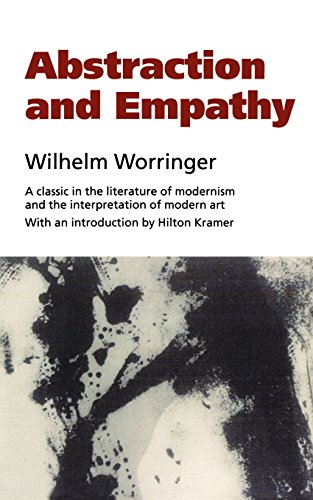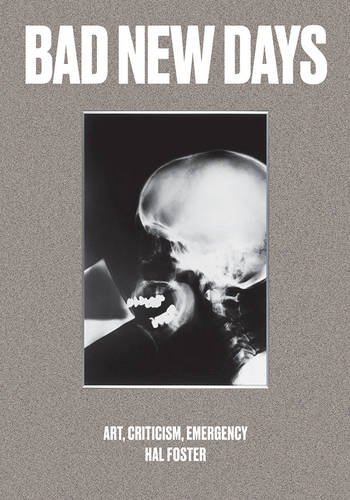Wilhelm Worringer: Abstraction and Empathy: A Contribution to the Psychology of Style (1907–)
Filed under book | Tags: · aesthetics, art, art history, art theory

“In this text, Worringer identifies two opposing tendencies pervading the history of art from ancient times through the Enlightenment. He claims that in societies experiencing periods of anxiety and intense spirituality, such as those of ancient Egypt and the Middle Ages, artistic production tends toward a flat, crystalline ‘abstraction’, while cultures that are oriented toward science and the physical world, like ancient Greece and Renaissance Italy, are dominated by more naturalistic, embodied styles, which he grouped under the term ’empathy’. As was traditional for art history at the time, Worringer’s book remained firmly engaged with the past, ignoring contemporaneous artistic production. Yet in the wake of its publication, Abstraction and Empathy came to be seen as fundamental for understanding the rise of Expressionism and the role of abstraction in the early twentieth century.”
First published as author’s dissertation entitled Abstraktion und Einfühlung, Heuser, Neuwied, 1907.
English edition
Translated by Michael Bullock
Publisher International University Press, New York, 1953
New edition with an Introduction by Hilton Kramer published by Ivan R. Dee, Chicago, 1997
ISBN 1566631777, 9781566631778
144 pages
WorldCat (EN)
Abstraktion und Einfühlung (German, 1907, further editions: 3rd, 1911, 11th, 1921)
Abstraction and Empathy (English, 1953/1997, 9 MB)
Hal Foster: Bad New Days: Art, Criticism, Emergency (2015)
Filed under book | Tags: · abject, aesthetics, archive, art, art criticism, art history, critique, dialectic, fetish, mimesis, neoliberalism, poststructuralism, precarity, theory

“Bad New Days examines the evolution of art and criticism in Western Europe and North America over the last twenty-five years, exploring their dynamic relation to the general condition of emergency instilled by neoliberalism and the war on terror.
Considering the work of artists such as Thomas Hirschhorn, Tacita Dean, and Isa Genzken, and the writing of thinkers like Jacques Rancière, Bruno Latour, and Giorgio Agamben, Hal Foster shows the ways in which art has anticipated this condition, at times resisting the collapse of the social contract or gesturing toward its repair; at other times burlesquing it.
Against the claim that art making has become so heterogeneous as to defy historical analysis, Foster argues that the critic must still articulate a clear account of the contemporary in all its complexity. To that end, he offers several paradigms for the art of recent years, which he terms “abject,” “archival,” “mimetic,” and “precarious.””
Publisher Verso, London and New York, 2015
ISBN 1784781460, 9781784781460
208 pages
Presentation and discussion (video, The Kitchen, NYC, Sep 2015)
Interview (John Douglas Millar, Mute, Nov 2015)
Reviews: Mark Steven (Affirmations 2015), Brian Dillon (Guardian 2015), Rachel Wetzler (ArtNews 2015).
Comment (1)Glória Ferreira (ed.): Crítica de Arte no Brasil: temáticas contemporâneas (2006) [BR-PT]
Filed under book | Tags: · aesthetics, art, art criticism, art history, art theory, avant-garde, brazil, concrete art, constructivism, contemporary art, media, neo-concrete art, painting

A collection of 91 texts by 80 authors that represent a multidisciplinary universe of ideas and opinions regarding the visual arts of Brazil from 1946-2006. The essays are divided into 7 main topics: Constructive Tradition; Avant-Garde / Experimentalism; Art Criticism; Circuits; Return / Permanence of Painting; Images and Media; and Transitive Situations.
The authors include Mário Pedrosa, Ferreira Gullar, Aracy Amaral, Décio Pignatari, Mario Schenberg, Frederico Morais, Paulo Sérgio Duarte, Hélio Oiticica, Reynaldo Roels Junior, Murilo Mendes, Fernando Cocchiarale, Cildo Meireles, Walmir Ayala, Ronaldo Brito, Antonio Dias, Jorge Guinle, Paulo Herkenhoff, Waldemar Cordeiro, Haroldo de Campos, Roberto Pontual, Arlindo Machado, Wilson Coutinho and Joaquim Ferreira dos Santos.
Publisher Funarte, Rio de Janeiro, 2006
Pensamento crítico series
ISBN 8575070797, 9798575070795
575 pages
PDF (32 MB)
Comment (0)
